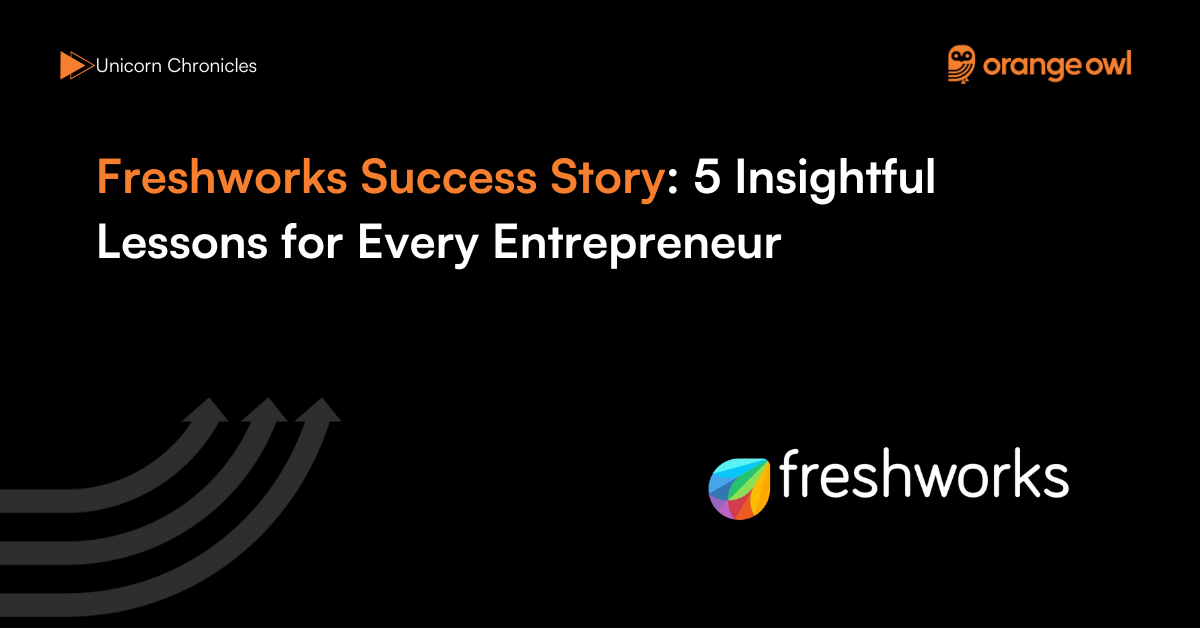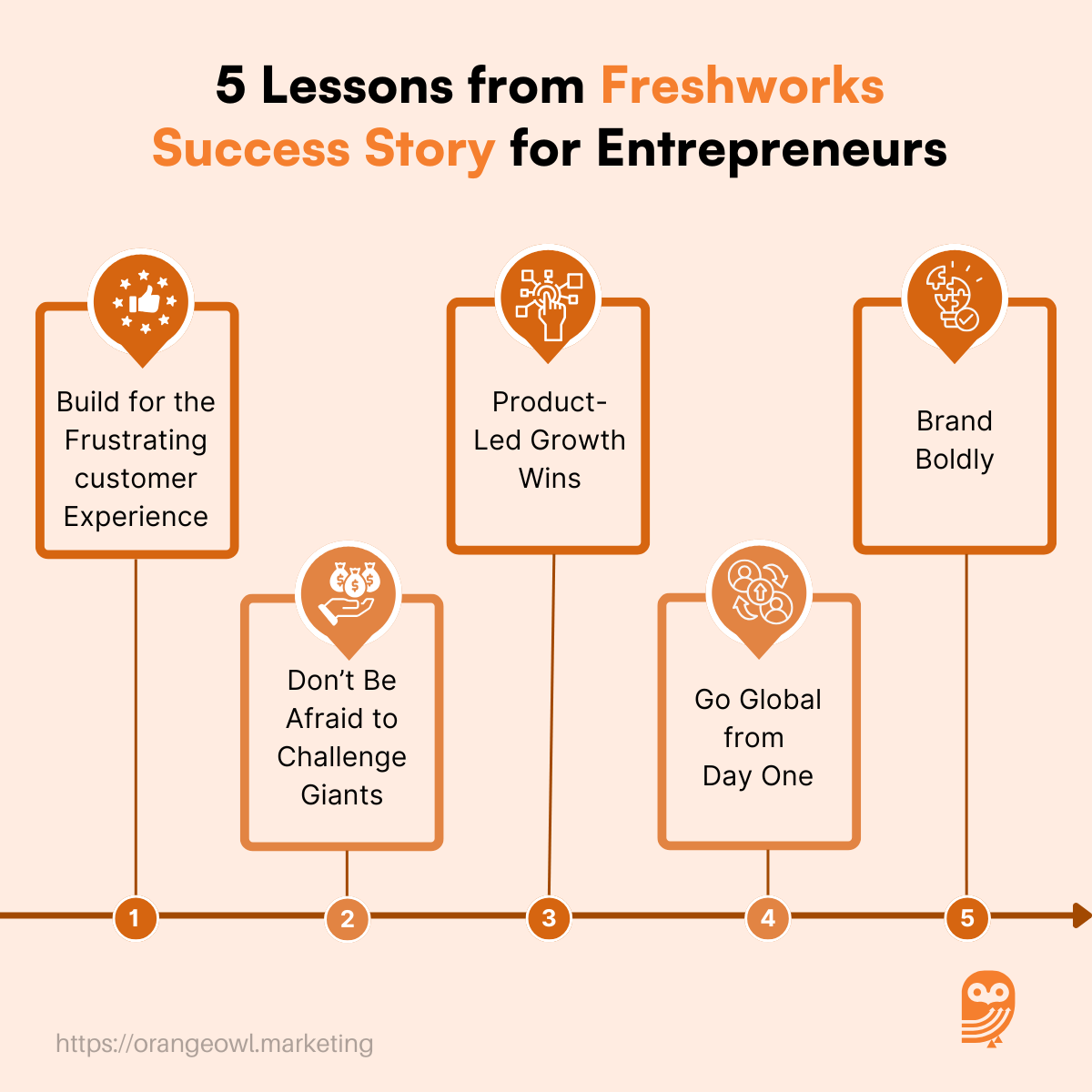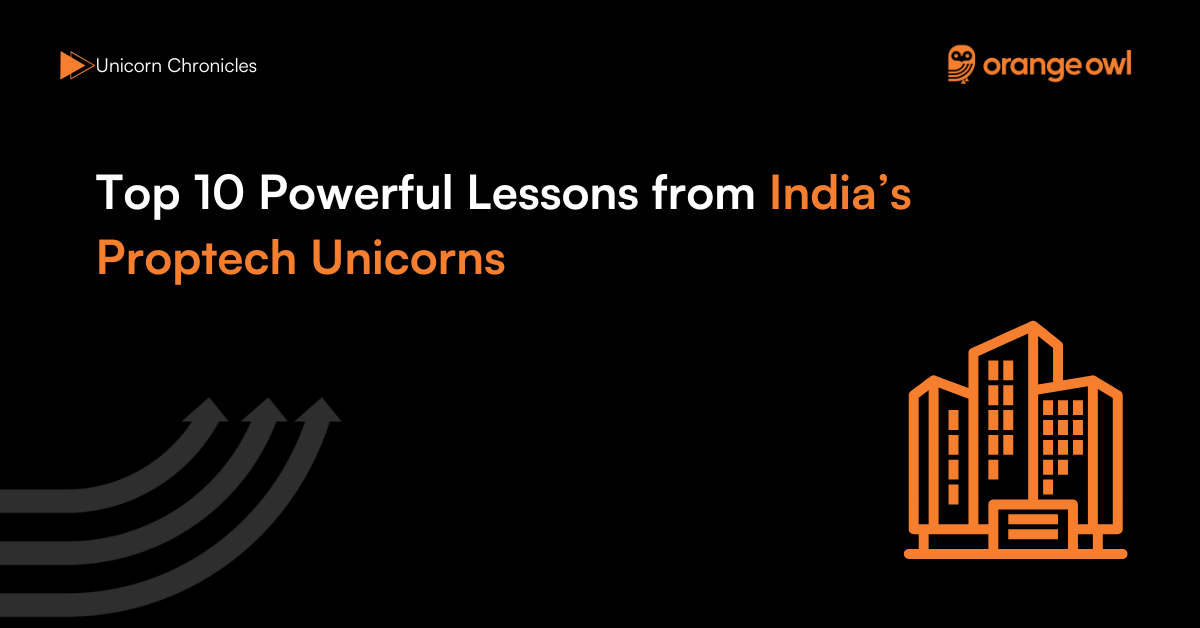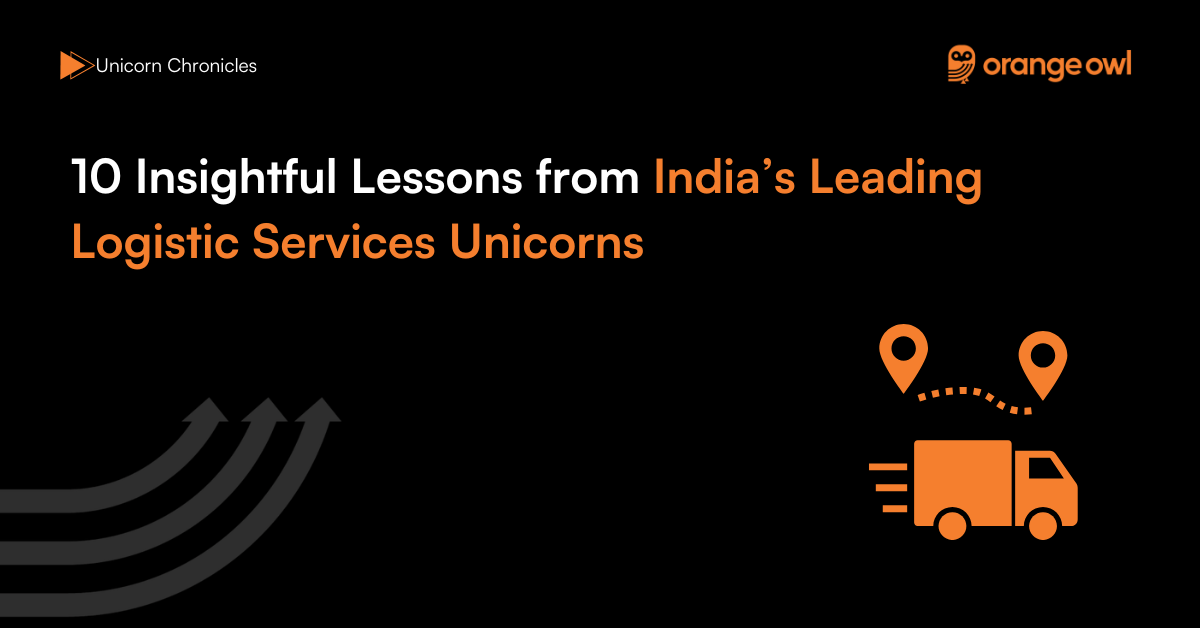Freshworks Success Story: 5 Insightful Lessons for Every Entrepreneur
Vivek Goel
April 29, 2025

Table of Contents
Introduction
In the competitive landscape of Software-as-a-Service (SaaS), Freshworks has distinguished itself by prioritizing customer experience in product development. Founded in 2010 by Girish Mathrubootham and Shan Krishnasamy in Chennai, India, the company began as a single-product startup named Freshdesk. Over the years, Freshworks has evolved into a NASDAQ-listed enterprise, serving over 67,000 customers worldwide, including prominent brands like Honda, Bridgestone, and Hugo Boss .
The inception of Freshworks was driven by a personal frustration with inadequate customer support experiences. This motivation led to the development of user-centric software solutions that address real-world problems. The company’s commitment to simplicity and user satisfaction has been a cornerstone of its growth strategy. In 2021, Freshworks achieved a significant milestone by going public on the NASDAQ, raising over $1 billion and attaining a valuation of approximately $13 billion .
“I wasn’t chasing a billion-dollar dream. I was solving a problem that annoyed me as a customer.” – CEO Girish Mathrubootham
This quote encapsulates the ethos of Freshworks—a company built on the foundation of addressing genuine customer needs with innovative solutions.
Origin Story
Freshworks didn’t start in a boardroom—it began with a tweet and a moment of consumer empathy. In 2009, Girish Mathrubootham, then Vice President of Product Management at Zoho, stumbled upon a forum post that would change his life. A user had shared a frustrating experience about being forced to pay $500 to replace a damaged television, simply because the customer service process had failed them. This incident struck a chord with Girish. He realized that while large enterprises might afford clunky, expensive helpdesk software, small and medium-sized businesses (SMBs) were still struggling with outdated or overpriced solutions.
This frustration sparked an idea: build a customer support software that was not just powerful but also intuitive and affordable for growing businesses. Girish knew the pain point was real—he had felt it both as a product manager and as a consumer. The concept of Freshdesk began to take shape, aimed at disrupting incumbents like Zendesk with a more customer-obsessed, value-driven alternative.
Working out of his house in Chennai with co-founder Shan Krishnasamy, a talented technical architect, the duo started building the first version of Freshdesk. Without venture capital, a fancy office, or even an elaborate go-to-market plan, they focused on a single mission—making customer support delightfully simple for SMBs.
“The market didn’t need another Zendesk; it needed a simpler, better one for growing businesses.” – Girish Mathrubootham
This vision resonated with thousands of businesses looking for a no-nonsense, easy-to-deploy solution—and it laid the foundation for what would eventually become Freshworks.
Business Space and Early Challenges
Breaking into the global SaaS market is tough for any startup—but doing it from Chennai, India in 2010 came with an added layer of complexity. Freshdesk (now Freshworks) wasn’t just trying to build a great product; it had to challenge stereotypes about software “Made in India.” Many customers in the West were hesitant to trust offshore customer support platforms, assuming issues with reliability, quality, or service. Overcoming this geographic and perceptual bias was one of the first major hurdles the team faced.
The real crucible moment came when Freshdesk was publicly criticized by none other than Mikkel Svane, the then-CEO of Zendesk, a leading competitor. In a now-infamous comment thread on a tech blog, Svane accused Freshdesk of copying Zendesk’s model. For many early-stage startups, such direct criticism could have been a setback. But Girish Mathrubootham saw it as an opportunity. Rather than getting defensive, he flipped the script. He wrote a detailed and transparent blog post defending Freshdesk’s originality and purpose, and the David vs. Goliath narrative took off.
“We were called a rip-off. But that tweet from Zendesk’s CEO gave us more visibility than we could’ve ever bought.” — Girish Mathrubootham
The incident not only brought Freshdesk into the spotlight but also galvanized support from the Indian startup ecosystem. It showed that the team had grit, confidence, and a strong belief in their product. From that moment on, Freshdesk doubled down on innovation and product quality. By maintaining a close loop with customers and iterating rapidly based on their feedback, the company began building a solution that wasn’t just an alternative—it was better suited for the evolving needs of modern SMBs.
What started as a challenge became a defining moment in Freshworks’ journey, setting the tone for a brand that thrives on customer obsession, agility, and boldness.
Growth Strategies
Freshworks’ meteoric rise wasn’t a stroke of luck—it was the result of a calculated, customer-centric growth strategy. Rather than chasing large enterprises from day one, the company focused on building intuitive software for small and mid-sized businesses (SMBs), a segment often underserved by clunky, expensive enterprise solutions. The goal was clear: deliver enterprise-grade functionality with startup-level simplicity.
The company began with Freshdesk, its flagship customer support product, but quickly recognized the need for adjacent tools that could enhance the customer journey. This insight gave birth to a full suite of SaaS products including Freshsales (CRM), Freshchat (messaging), Freshmarketer (marketing automation), and others. By creating a unified platform under one umbrella, Freshworks enabled businesses to seamlessly integrate customer support, sales, and marketing without juggling multiple vendors. This product ecosystem created powerful cross-sell and upsell opportunities, helping the company grow revenue efficiently.
“We didn’t want to build just one product. We wanted to build a suite that could power the full customer experience.” – Girish Mathrubootham
The real turning point, however, came with Freshworks’ pioneering of the inside sales model from India, targeting SMBs in developed markets like the U.S. and Europe. At a time when most companies believed you needed a local presence to sell globally, Freshworks proved otherwise. By hiring skilled sales professionals in Chennai and training them to close deals remotely, the company achieved scalability and cost-efficiency that gave it a competitive edge.
“We cracked the inside sales model from India to sell to the world. That gave us an edge on efficiency.” – Girish Mathrubootham
This strategy not only widened the company’s reach but also established Freshworks as a model for SaaS startups in emerging markets. By combining a smart product roadmap with a lean, scalable sales engine, Freshworks built the momentum that would eventually carry it to IPO and beyond.
Marketing Strategies
Freshworks stood out in the SaaS world not just through its products but through its bold, unconventional approach to marketing. Unlike many B2B software companies that often default to bland, technical messaging, Freshworks embraced a lively, consumer-friendly brand personality. This fresh take was deliberate—and deeply effective.
The company made strategic investments in high-visibility sponsorships to position itself as a global player. From becoming the official CRM partner of the Indian Premier League (IPL) to airing commercials during the Super Bowl, Freshworks signaled that SaaS could be mainstream, exciting, and accessible. These big-stage moments gave the company an opportunity to reach millions of users in one go, driving both awareness and credibility across markets.
“SaaS doesn’t have to be boring. We brought personality into our brand—and it resonated.” – Girish Mathrubootham
But Freshworks didn’t rely on splashy marketing alone. The brand was equally committed to building long-term trust through education and community engagement. Their marketing team created blogs, webinars, templates, and tools tailored to the needs of small and mid-sized businesses, making complex concepts digestible and actionable. This thoughtful content strategy helped position Freshworks not just as a vendor, but as a partner in growth.
At the grassroots level, Freshworks also fostered communities of practice by hosting meetups, sponsoring tech conferences, and collaborating with startup ecosystems across the globe. The goal wasn’t just to generate leads, but to build a movement around making business software more intuitive, affordable, and human-centered.
This two-pronged marketing play—mainstream visibility with grassroots authenticity—set Freshworks apart in a competitive landscape and played a crucial role in the company’s journey to becoming a global SaaS powerhouse.
5 Lessons Every Entrepreneur Should Learn from Freshworks
1. Build for the Frustrating customer Experience
Freshworks wasn’t born in a strategy session—it was sparked by a genuine, frustrating customer experience. When Girish Mathrubootham read a forum post about a man who had to pay $500 to fix his broken TV due to poor support, it resonated with him. Having faced similar issues himself, Girish saw an opportunity to build a better solution. That moment of empathy became the seed for Freshdesk—the first product under the Freshworks umbrella.
“I didn’t find the idea in Silicon Valley. I found it in a forum post.” – Girish Mathrubootham
This is a critical entrepreneurial insight: some of the best startup ideas come from fixing personal pain points that millions silently endure. When you solve a problem you understand intimately, you build with clarity, urgency, and authenticity—just like Freshworks did.
2. Don’t Be Afraid to Challenge Giants
Freshworks didn’t enter the market quietly. Early on, the company faced criticism from the CEO of Zendesk, who accused Freshdesk of being a copycat. Instead of backing down, Girish leaned into the moment. He responded publicly and positively, highlighting how the controversy had inadvertently given them more visibility than any ad campaign ever could.
This bold response turned Freshworks into a David vs. Goliath story—something the media and customers rallied behind. The lesson here is simple: don’t fear the giants. If your product solves a real need, and you serve customers better, you deserve to be in the arena.
“We were called a rip-off. But that tweet from Zendesk’s CEO gave us more visibility than we could’ve ever bought.” – Girish Mathrubootham

3. Product-Led Growth Wins
Freshworks invested early in building products that spoke for themselves. From clean interfaces to rapid deployment, they prioritized simplicity, functionality, and constant user feedback. Rather than relying heavily on traditional sales and marketing tactics, they trusted the product to do the heavy lifting.
This approach empowered users, reduced churn, and fueled word-of-mouth growth—especially important when targeting small and mid-sized businesses across the globe. When your product delivers value quickly and effortlessly, it becomes your best salesperson.
“Great products are your best salespeople.” – Girish Mathrubootham
4. Go Global from Day One
While many Indian startups initially focus on the domestic market, Freshworks had international ambitions from the start. They built an efficient inside sales model from their Chennai office and targeted U.S. and European SMBs—often landing customers without ever meeting them in person.
This early decision to “build in India, sell globally” gave them a huge cost advantage and allowed them to scale rapidly. It also positioned them as one of the first truly global SaaS players to emerge from India.
The takeaway? Think globally, even if you’re operating from a small office. Digital tools make borders irrelevant—ambition and execution are what count.
“We cracked the inside sales model from India to sell to the world. That gave us an edge on efficiency.” – Girish Mathrubootham
5. Brand Boldly
In a category known for blandness, Freshworks stood out by infusing its brand with personality. Their advertising wasn’t just strategic—it was fun, memorable, and often unconventional. Whether it was a cheeky Super Bowl ad or becoming the official CRM partner of the IPL, Freshworks knew how to make SaaS cool.
This boldness made them not only recognizable but relatable—especially to small businesses looking for tools that didn’t feel like they were built for enterprises 100x their size.
“The world doesn’t need more boring software companies.” – Girish Mathrubootham
Conclusion: Key Takeaways from Freshworks’ Journey
Freshworks’ journey from a modest home office in Chennai to a $13 billion IPO on NASDAQ is more than just a business success—it’s a powerful narrative of grit, clarity, and customer-centric innovation. What began with a single product built to solve a simple frustration evolved into a global SaaS powerhouse that now serves over 60,000 businesses across the world.
At its core, Freshworks is a testament to what’s possible when entrepreneurs stay laser-focused on real user pain points, rather than getting distracted by hype or trends. The company’s early decision to take on giants like Zendesk, while staying grounded in user experience and affordability, showed that disruption doesn’t require size—it requires purpose and bold execution.
Moreover, Freshworks proved that global ambition can be launched from anywhere—even from a small house in South India. By embracing inside sales, simplifying software for SMBs, and delivering delightful experiences across its suite of tools, Freshworks showed that you don’t need to be in Silicon Valley to build a global tech brand—you just need vision, persistence, and empathy for your users.
For entrepreneurs, the Freshworks story is a living playbook. Whether it’s the importance of product-led growth, the value of brand personality, or the courage to stand your ground, Girish Mathrubootham and his team have illustrated that building a world-class company is possible on your own terms—without compromising on culture, creativity, or customer love.
“We weren’t trying to be the next Salesforce. We were trying to be the first Freshworks.” – Girish Mathrubootham


